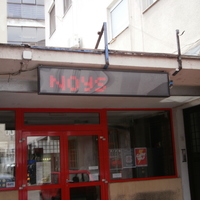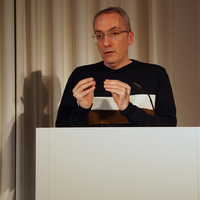Books by Daniela Mercieca

...The impact which my decisions will have on this child's life is enormous and far-reaching. Rel... more ...The impact which my decisions will have on this child's life is enormous and far-reaching. Relatively speaking, the impact which she will have on my life is minimal. She will be a thought in my mind, at most, an incessant worry. Yet even this is grudged - we professionals tell each other that we have to leave our work behind when we go home - don't take your work worries with you... (p.85) This book calls for a re-thinking of practice and research with children in the helping professions. In the context of today's fast world with its requirement for order and precision, the practice of working with children is imbued with ethical dilemmas which practitioners may or may not be aware of. It is important for the practitioner to feel suspended in uncertainty before taking action. In terms of research, the complexity of what is explored is reflected in the complexity of the research method. In a parallel writing, this uncertainty is a central theme in practice through the narrative of three stories of the author's involvement with children referred for support. The book explores how uncertainty and anxiety can be turned to good use rather than being a debilitating force to the practising psychologist. It also touches upon issues of performativity, accountability and efficiency in the becoming of professionals in the helping professions.
Papers by Daniela Mercieca

Malta Review of Educational Research, 2020
Engaging with the ethics of care as developed by Nel Noddings, this paper unpacks the perceptions... more Engaging with the ethics of care as developed by Nel Noddings, this paper unpacks the perceptions of three primary teachers working in Scotland during COVID-19 lockdown. Noddings constructs her ethics of care as relational. This focus on the 'relation' is central to the paper and the three themes that emerged from analysing the in-depth interviews conducted with the teachers show different facets of the relations teachers were engaged in during the lockdown. The first theme looks at the teachers' work during COVID-19 lockdown as embedded within a larger Scottish discourse that has care as central to its formation. The second theme discussed the idea of reciprocity-care ethics focuses on acknowledgment of the relation between the carer and the cared for. The third theme focuses on parents as being intermediary between the teachers and students. The paper suggests that the experience of lockdown offered primary school teachers new possibilities of caring, thus giving teachers the possibility to go beyond the 'norm' of care established within their classrooms and schools.

This commentary acknowledges Barbara Held's (2020) idea that knowledge of, from, and for people c... more This commentary acknowledges Barbara Held's (2020) idea that knowledge of, from, and for people can create epistemic violence. We look at this through the idea of binaries and how binaries distribute a particular sense in knowledge. We argue that the researcher's engagement with uncertainty offers possibilities of becoming for the researcher, the researched, and the research process in a way that opens up such binaries and the distribution of the sensible. Keywords assemblage, becoming, distribution of the sensible, research, uncertainty We are sympathetic to Barbara Held's (2020) argument that knowledge of, from, and for people can create epistemic violence. We want to focus this short commentary by highlighting some nouns and pronouns that Held uses throughout her article. She writes about the I, we, us, them, their(s), as well as (non)folks and (non)othered, amongst others, highlighting the person. Her emphasis on the person allows us to acknowledge that the method is influenced by the individuals who engage with it, whether that individual is applying the method, or whether she is the one the method is being applied to. Thus, although allowing the influence of people in the research equation is a progress from Francis Bacon's claim that the (scientific) research process should work "as if by machin-ery" (Bacon, 1905/2011, p. 256), Barbara Held invites us to consider that what was introduced to remove epistemic violence (the acknowledgment of subjectivity) could nonetheless be contributing to it. It is almost as though research, knowledge, science, and psychology are inherently oppressive.

Malta Review of Educational Research, 2020
Engaging with the ethics of care as developed by Nel Noddings, this paper unpacks the perceptions... more Engaging with the ethics of care as developed by Nel Noddings, this paper unpacks the perceptions of three primary teachers working in Scotland during COVID-19 lockdown. Noddings constructs her ethics of care as relational. This focus on the 'relation' is central to the paper and the three themes that emerged from analysing the in-depth interviews conducted with the teachers show different facets of the relations teachers were engaged in during the lockdown. The first theme looks at the teachers' work during COVID-19 lockdown as embedded within a larger Scottish discourse that has care as central to its formation. The second theme discussed the idea of reciprocity-care ethics focuses on acknowledgment of the relation between the carer and the cared for. The third theme focuses on parents as being intermediary between the teachers and students. The paper suggests that the experience of lockdown offered primary school teachers new possibilities of caring, thus giving teachers the possibility to go beyond the 'norm' of care established within their classrooms and schools.
International Journal of Inclusive Education, 2019
This paper revisits The Salamanca Statement and Framework for Action through Jacques Rancière’s ... more This paper revisits The Salamanca Statement and Framework for Action through Jacques Rancière’s writing about the distribution of the sensible. It questions the supports provided within the Maltese state education system and asks readers to ‘think again’ by asking what has been left out. The Salamanca Statement is seen as reflected within the Maltese education system, both of which, however, position people and services in particular spaces. As systems, they have a totalising quality, which disables thought or any possibility outside that which is given. They also make assumptions about equality that is achieved, whereas Rancière writes about equality as a starting point and a presupposition. This is what gives democracy and politics a possibility, two values that are at the heart of inclusion.
Various instruments that have the aim of assessing children even from a very young age are consta... more Various instruments that have the aim of assessing children even from a very young age are constantly being developed. We argue that these instruments and assessment processes risk removing judgement from educators and teachers. Using the Aristotelian concept of phronêsis, we argue that teachers need to develop a habit of engaging with practical judgments with children. This is done through being attentive to children, that gives us the possibility to ‘see the ordinary world around us’ [Smith, R. 1999. ‘Paths of Judgment: The Revival of Practical Wisdom.’ Educational Philosophy and Theory 31 (3): 327–340, 334].
Educational psychologists (EP) are constantly engaged in diagnosing and labelling children. In th... more Educational psychologists (EP) are constantly engaged in diagnosing and labelling children. In this article, we explore this by thinking of the EP as a translator, where the child is translated into psychologised discourse which often results in the allocation of support. This paper questions this act of translation and the role of the EP as the translator. Through Derrida’s writing we point out that this process of translation is not automatic and linear, but is rather complex, uncertain, and aporetic in nature. The EP is caught in a double-bind in this process of translation. We argue that while this could be difficult for the EP, this offers possibilities for transgressions. This article draws upon vignettes from EP practice to question processes of labelling and diagnosis.
Ethics and Education, 2016

One of the major tasks of educational psychologists is the writing of reports. Often, all involve... more One of the major tasks of educational psychologists is the writing of reports. Often, all involvement, assessment and intervention culminate in the production of a report. This paper explores critically the tensions involved in writing reports which are closed down in their conformity to requirements of different bodies, while looking for possibilities of openings in this closure. We acknowledge that report-writing is caught in the economies of exchange and the impossibility of gift-giving, based on the writing of Jacques Derrida. This paper will draw upon a small qualitative study of seven experienced school psychologists, and using a Derridian framework, it makes the familiar strange and the strange familiar [Biesta, G., J. Allan, and R. Edwards. 2011. “The Theory Question in Research Capacity Building in Education: Towards an Agenda for Research and Practice.” British Journal of Educational Studies, 59 (3): 225–239.] on the process of report-writing.

This paper begins by illustrating how the social model of disability currently dominant in emanci... more This paper begins by illustrating how the social model of disability currently dominant in emancipatory disability research projects a reality ‘out there’. Drawing on John Law's (2004) writing on how statements are turned into taken-for-granted assumptions, we argue that the model of research exemplified by Colin Barnes (2002) stifles rather than enables the emancipatory understanding of disability. We explore how disability research might be otherwise conceived through Gilles Deleuze and Félix Guattari's (1988, 1994) concepts of series, layers and rhizomes. We suggest that by engaging with the intensities offered by the research, instead of standing aloof from them, the researcher can expose herself to new possibilities of understanding disability. Research is rethought as becoming through engagement with intensities rather than as interpretation of a pre-existent reality out there.

Method creates relationships in research. It positions everyone and everything in the research pr... more Method creates relationships in research. It positions everyone and everything in the research process. When method is based on a misrepresentation of science, the relationships formed are technical, closed and self-referential. Using a Deleuze – Guattari framework we are concerned that scientific method in qualitative research solidifies, crystallizes and archaeologizes the research. This paper questions what is being ruled out and deemed as unimportant, or indeed contaminating and fallacious in such research. We argue for the acknowledgement of uncertainty as this allows for more engagement with the research and researched. Deleuze and Guattari argue for multiplicity, connectivity and becoming. This paper calls for acknowledging and mentoring uncertainty at every stage of the teaching and learning of method.
Keywords: uncertainty; engagement; research; methodology; Deleuze–Guattari; relationship
Early intervention comes in-between the lives of children, families and teachers. This article us... more Early intervention comes in-between the lives of children, families and teachers. This article uses part of a report written by an educational psychologist about a little girl to question the nature of intervention through Rancie`re’s writings. As children and parents are seen as put into the position of inadequacy, they require such intervention, which in turn makes them more inadequate. The article goes on to highlight the numerous ‘givings’ involved in early intervention, through Derrida’s writing. However, such giving is questioned as creating expectations that receivers of the gift must fulfil, thus nullifying the gift. The conclusion suggests that starting from a perspective of equality and acknowledging the aporia involved could help the people in this scenario to take a different approach.
Keywords: early intervention, Rancie`re, Derrida, psychologist, giving, aporia

This paper outlines a typical referral made on behalf of a school to the author, who is an educat... more This paper outlines a typical referral made on behalf of a school to the author, who is an educational psychologist. Regarded as the expert, the psychologist is consulted by the head of school with the expectation that answers can be given as to what works with the child in question. In the context of a runaway world, it is easy to look for that which is certain and for what works. The aim of the paper is to problematize the view of the expert psychologist who always knows and who can impart skills which will solve the problem. It seeks to put forward the idea of the professional who works with uncertainty and who acknowledges the importance of, rather than resists, the idea of not knowing. Notwithstanding the attempts of the institutions within which the professions work to standardize procedures and responses, and notwithstanding the attempts to leave nothing to chance, children still slip through the gaps. The author is suggesting that an openness to contingency and uncertainty will allow for the complex situations which constitute children’s difficulties, and thus ensure better professionalism. In turn, learning to tolerate not knowing generates the professional who is in a constant process of becoming through her practice. Through thinking again, the practitioner is encouraged to be open to the complexities which children’s situations offer.
Keywords Educational Psychologist; Uncertainty; Dilemmatic Thinking; Children; Complexity; Professionalism; School; Expert Practitioner
This paper draws upon Deleuze and Guattari’s ideas to suggest a different kind of reading of a n... more This paper draws upon Deleuze and Guattari’s ideas to suggest a different kind of reading of a narrative of a mother of a child with severe disability, and thus a different kind of ethical response to them. This reading gives readers the possibility of opening up experiences of parents and children with disability, rather than compartmentalising such stories. The reader becomes, is transformed, through reading these narratives and through engaging with the intensities which are recognised in the text, asking the question ‘Does it work for me?’ This is what Gilles Deleuze calls ‘reading with love’.
Keywords: reading; narratives; Deleuze and Guattari; cerebral palsy; intensities

This paper argues that a shift needs to take place in adults so that listening to young children ... more This paper argues that a shift needs to take place in adults so that listening to young children can occur. In the context of educational psychologists (EPs), this is perhaps more crucial, as EPs are positioned in a way that makes listening an integral part of their role. Yet, EP work forms part of this ‘runaway world’ and this sometimes necessitates that practitioners become doubly aware of the need to resist pressures of speed and work load, if any listening is to happen at all. Rancière’s writing is used to question assumptions about the young child’s voice and our listening. The shift that Rancière suggests starts with the assumption that adults and even very young children are equal, so that the listening which we are advocating is one which does not silence. The paper then moves on to reflect on the Mosaic approach, as a methodological tool and process for listening to young children. Rather than being another method, the Mosaic approach espouses uncertainty and allows for unexpectedness – young children are seen as giving adults the possibility to listen to them. In the conclusion we consider the implications of Rancière and the Mosaic approach for the work of EPs.
Keywords: Listening; child; Jacques Rancière; psychologist; Mosaic approach; early years.

In the fast-paced society in which we live, we find ourselves using convenient ‘shorthand’ to hel... more In the fast-paced society in which we live, we find ourselves using convenient ‘shorthand’ to help our work become conveniently more practical. Whether giving a lecture, conducting an assessment or writing up any of the above processes we resort to shorthand for the sake of efficiency, and sometimes in the belief that it makes us more professional. In so doing, we risk forgetting the contradictions in the language and practices that we use as this is suppressed in the shorthand. This paper shows how narrative helps practitioners and researchers to create spaces in their work where children escape the compartmentalisation. Through narrative, possibilities are created in the closed spaces that constitute shorthand practices. Using vignettes of lecturing and assessment, this paper gives examples of how narrative allows for practice that is more respectful of children. We will be using Lyotard’s writing on grand and small (petit) narratives on performativity, and Derrida’s idea of aporia.
Keywords: shorthand; aporia; grand and petit narratives; Derrida; educational psychology.
This paper aims to explore the issue of literacy for children with profound and multiple learning... more This paper aims to explore the issue of literacy for children with profound and multiple learning difficulties (PMLD). A group of parents met for six sessions with the authors and discussed how literacy could be applied to their children in the homes. A multi-sensory approach was discussed and experimented with using various texts mentioned in the article. This paper deals with three main ideas, namely challenging parental constructions about their children and about literacy and story-telling; the possible therapeutic role of such a process and its ensuing influence on parents’ roles as advocates for their children; and the idea of experimenting with stories and practices using the senses. In conclusion, the relevance of the above for practising educational psychologists is highlighted.

Educational contexts are often built on assumptions that are considered common and good by the ma... more Educational contexts are often built on assumptions that are considered common and good by the majority of persons working within these contexts. Policy and specialisation, originally means to operationalising these assumptions, have become ends and reference points in themselves. The encounter with children is becoming less and less the centre of education endeavour. This often brings about the experience of tiredness as endless effort is placed by different educational professionals in trying to contain the different forces at play within particular scenarios. Following Deleuze, we suggest exhaustion, which he distinguishes from tiredness. Exhaustion comes about from having endless possibilities. This however involves the violent encounter of nonsense which shakes sense assumptions. We argue that engaging with children is this violent encounter which is essential for the professional in education.
Talks by Daniela Mercieca

SERA Inclusive Practice Network seminar, 2020
This SERA Inclusive Practice Network event where Dr Daniela Mercieca and Dr Duncan P Mercieca of ... more This SERA Inclusive Practice Network event where Dr Daniela Mercieca and Dr Duncan P Mercieca of the School of Education & Social Work, University of Dundee, shared findings from their research project inquiring about the lockdown experience of primary school teachers and Head Teachers in Scotland. The purpose of the study was to gain insight into the lived experiences of primary school educators in Scotland delivering the curriculum from home, and/or working in the hubs, and to explore the impact of such experiences on their identities as teachers and on their views of teaching, learning and curriculum, in response to the research question: What are educators’ experiences of teaching from home/in hub during the Covid-19 lockdown in Scotland?
see link: https://discovery.dundee.ac.uk/en/publications/sera-inclusive-practice-network-seminar-teaching-and-learning-in-











Uploads
Books by Daniela Mercieca
Papers by Daniela Mercieca
Keywords: uncertainty; engagement; research; methodology; Deleuze–Guattari; relationship
Keywords: early intervention, Rancie`re, Derrida, psychologist, giving, aporia
Keywords Educational Psychologist; Uncertainty; Dilemmatic Thinking; Children; Complexity; Professionalism; School; Expert Practitioner
Keywords: reading; narratives; Deleuze and Guattari; cerebral palsy; intensities
Keywords: Listening; child; Jacques Rancière; psychologist; Mosaic approach; early years.
Keywords: shorthand; aporia; grand and petit narratives; Derrida; educational psychology.
Talks by Daniela Mercieca
see link: https://discovery.dundee.ac.uk/en/publications/sera-inclusive-practice-network-seminar-teaching-and-learning-in-
Keywords: uncertainty; engagement; research; methodology; Deleuze–Guattari; relationship
Keywords: early intervention, Rancie`re, Derrida, psychologist, giving, aporia
Keywords Educational Psychologist; Uncertainty; Dilemmatic Thinking; Children; Complexity; Professionalism; School; Expert Practitioner
Keywords: reading; narratives; Deleuze and Guattari; cerebral palsy; intensities
Keywords: Listening; child; Jacques Rancière; psychologist; Mosaic approach; early years.
Keywords: shorthand; aporia; grand and petit narratives; Derrida; educational psychology.
see link: https://discovery.dundee.ac.uk/en/publications/sera-inclusive-practice-network-seminar-teaching-and-learning-in-